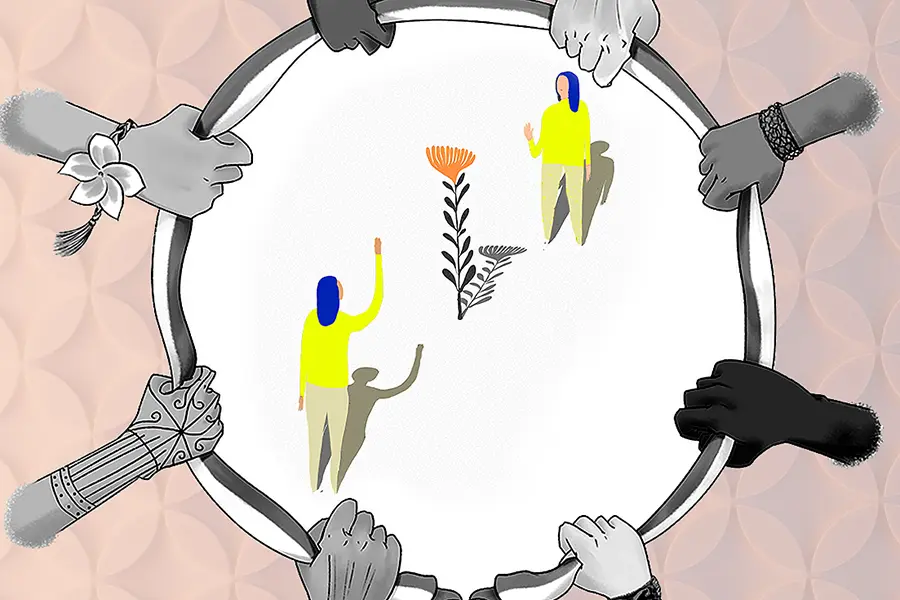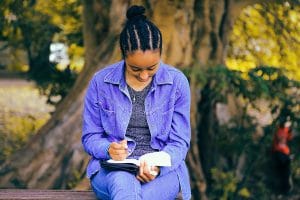It’s the psychedelic renaissance. Researchers, patients, and psychonauts uttered those words like a mantra over the past few years. Denver and Oakland decriminalized psilocybin mushrooms. Ketamine became an accepted treatment for PTSD and depression. Ironically, cannabis was a gateway—not to despair and ruin, but to paving the way for psychedelics to reclaim their rightful spot as a therapeutic elixir for the masses.
However, due to COVID-19, a pandemic so brutal that we likely won’t know the extent of its effects for years, if not decades, the “masses” no longer exist—at least out in public at the same time. Conferences are canceled. The Costa Rica ayahuasca trip you had planned before the pandemic is indefinitely on hold. Even if you can get your hands on psychedelics, many people don’t want to trip right now. “I’m worried about germs; I can get paranoid about that,” says Michelle Janikian, author of Your Psilocybin Mushroom Companion: An Informative, Easy-to-Use Guide to Understanding Magic Mushrooms.
Janikian had to cancel a book tour due to the pandemic. “I’ve been grieving that for a while,” she says. “I was going to do presentations on safe mushroom use. That was canceled, or postponed. I’m not starting yet until we really know what the future looks like,” she says.
We’re all grieving, whether we’re aware of it or not. We grieve for the dead, the sick, our social lives, our careers, our communities. “Within the psychedelic space, there’s been a lot of conversation about how this time has mimicked being in a global ayahuasca ceremony. Nobody knows what’s on the other side of it,” says Jennifer Sodini, the founder of an online platform called Evolve + Ascend. “The one thing in an ayahuasca ceremony, of many, that’s so important is practicing the divine art of surrender. The more you struggle with something the harder it gets. The more you surrender, the more you get clarity.” Sodini describes the concept of hiraeth, which she describes as a homesickness for something that doesn’t even exist.
We’re all grieving, whether we’re aware of it or not. We grieve for the dead, the sick, our social lives, our careers, our communities.
That something we’re all missing is community. Like many persecuted subcultures, the psychedelic scene has already gone digital. When COVID hit and large public gatherings became a thing of the past, psychedelics were uniquely suited to adapt to the new virtual world. It’s the direction we were heading in anyways. MAPS (the Multidisciplinary Association for Psychedelic Studies) is currently hosting an online webinar series that began on April 9th and runs through May 21. “We started talking about this webinar series a year ago and started developing it and inviting people several months before COVID,” explains Brad Burge, the director of strategic communications for MAPS.
Community organizers within the psychedelic space such as Sodini are also making space for online gatherings. She hosts an online gathering called Isolation Tank every Tuesday and Thursday made up of artists, creatives, and philosophers. Even at DoubleBlind, we’ve hosted online breathwork or integration sessions, Instagram Live interviews with experts in the space, and a course on how to grow mushrooms (tomorrow is the last day to register!). The psychedelic community didn’t have to go online when COVID hit, we already were online.

That’s not to say that there aren’t topics to be bummed about. COVID put all research on pause, although researchers are even studying ketamine as a treatment for COVID-19. While we can communicate online, we can’t take psychedelics online, which sucks, as many of us could use it more than ever. “COVID will increase the number of people with PTSD,” Burge says. I recently took ketamine orally at home for my depression, which has flared up while in quarantine, through a program called Mindbloom. And I’m not the only one. “Over 300 remote sessions have been booked since we announced the offering about a month ago, which speaks to the need right now,” says Dylan Beynon, founder of Mindbloom. They are also offering a free bi-weekly webinar series on navigating anxiety and depression during turbulent times.
How to Grow Shrooms Bundle
Take Both of Our Courses and Save $90!
Sadini describes the concept of hiraeth, which she describes as a homesickness for something that doesn’t even exist. That something we’re all missing is community.
While the educational component of online workshops and conferences is invaluable, most members of the community attend such events to connect with others. “It’s amazing that the conferences moved online, we get access to researchers and talks, but the really big part about the conferences for me was meeting and connecting with people,” Janikian says.
One of my quarantine gigs is hosting virtual play parties. At times, it’s depressing and beyond frustrating to connect with others in the scene—virtually—but not be able to touch them. However, I’ve noticed that through follow-up Zoom dates, despite the inability to meet up for sex, or perhaps because of it, people are going deeper. Couples are taking the time to really get to know their unicorns. Casual affairs are suddenly far more emotionally considerate. The same phenomenon exists for the psychedelic community.
“I’m sure people want to come and they want to sit in the academic research and learn. But mostly what they want to do is connect with others,” Burge says. There is a chat feature at all of MAPS webinars to meet new friends with similar interests.
Although, while we still can’t sit in circle and trip together, and the idea of taking shrooms with friends while wearing PPE (personal protective equipment) and following social distancing rules sounds like a bad trip waiting to happen, we can continue to connect and follow the upwards trajectory that psychedelics were already on—while remembering our strength that prepared us for this moment.

DoubleBlind is a trusted resource for news, evidence-based education, and reporting on psychedelics. We work with leading medical professionals, scientific researchers, journalists, mycologists, indigenous stewards, and cultural pioneers. Read about our editorial policy and fact-checking process here.

DoubleBlind Magazine does not encourage or condone any illegal activities, including but not limited to the use of illegal substances. We do not provide mental health, clinical, or medical services. We are not a substitute for medical, psychological, or psychiatric diagnosis, treatment, or advice. If you are in a crisis or if you or any other person may be in danger or experiencing a mental health emergency, immediately call 911 or your local emergency resources. If you are considering suicide, please call 988 to connect with the National Suicide Prevention Lifeline.



